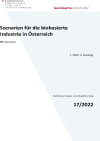Suchergebnisse
Material utilization of end-of-term textiles
Mechanical processing of the non-reusable part of collected end-of-life apparels (e.g. cutting, sifting, etc.); development of marketable application for the obtained short fibers in the field of construction materials (e.g. bitumen modification)
Secondary Materials in the Austrian Textile Industry - Study with Recommendations for the Austrian R&D-Politics
This study deals with the challenges and potentials for the use of secondary materials in the Austrian textile industry. It identifies challenges and potentials for establishing cycles in the textile industry with a focus on the use of secondary materials in Austria based on broad stakeholder involvement. Based on this, recommendations for research and development activities were formulated to promote recycling.
Berichte aus Energie- und Umweltforschung 1/2000 ZERIA - Zero Emissions Research in Austria

Möglichkeiten und Grenzen der Umsetzbarkeit der ZERI - Methodik auf die europäische, speziell die österreichische, Industrielandschaft
The Paper Factory in the Year 2030
Paper factory in the year 2030 as an integrated part of a sustainable economy and a supplier of sustainable paper products fulfilling criteria for sustainability at highest possible level.
ZERIA 3 (Zero Emissions Research in Application)
Erarbeitung von Methoden zur Umsetzung eines abfall- und emissionsfreien Produzierens. Die Ergebnisse zeigen, dass die Zero Emissions-Option eine reale ist und in vielen Fällen wirtschaftlich erreicht werden kann.
ZERIA 3 (Zero Emissions Research in Application)
Elaboration of the principles for zero emission enterprises. The results show that this approach can be realistic and economically advantageous in many cases.
Stoffliche Verwertung der textilen Restfraktion
Verwertung des im Zuge der Aussortierung von brauchbarer Second-hand Bekleidung aus gesammelter Altkleidung anfallende textile Abfall soll einer Wiederverwendung zugeführt werden; Entwicklung von automatisierten, mechanischen Verfahren zu Aufbereitung; Vermeidung von Abfall.
Berichte aus Energie- und Umweltforschung 8/1998 Innovationen für eine nachhaltige Entwicklung

Beitrag für die Ausrichtung eines Technologieschwerpunktes "Nachhaltig Wirtschaften"
Szenarien für die biobasierte Industrie in Österreich (BBI-Szenarien)

Um die Umsetzung der österreichischen Bioökonomiestrategie Österreichs (BMNT, BMBWF & BMVIT, 2019) zu unterstützen, wurden drei Szenarien für die biobasierte Industrie in Österreich
entwickelt. Die vorliegende Studie soll als solide Übersicht und als Startpunkt für weitere Detailstudien auch von weiteren Forscher:innen dienen.
Schriftenreihe
17/2022
T. Steffl, V. Reinberg
Herausgeber: BMK
Deutsch, 52 Seiten
Downloads zur Publikation
Improvement of resource efficient use of wood
Modelling of wood processing in order to demonstrate the developments' impacts on performance
RAINBOW 2
Überführung der in Rainbow 1 erarbeiteten Kenntnisse zur Entwicklung funktionalisierter Fasern aus nachwachsenden Rohstoffen in einen halbtechnischen Maßstab sowie auf verschiedene Faserherstellungsverfahren.
RAINBOW 2
Application and expansion of knowledge gained in the project Rainbow1 for the production of new, functionalised fibres using renewable resources as well as other fibre manufacturing methods in a pilot plant scale production.
Szenarien für die biobasierte Industrie in Österreich (BBI-Szenarien)
Um die Umsetzung der österreichischen Bioökonomiestrategie Österreichs (BMNT, BMBWF & BMVIT, 2019) zu unterstützen, wurden drei Szenarien für die biobasierte Industrie in Österreich entwickelt. Die vorliegende Studie soll als solide Übersicht und als Startpunkt für weitere Detailstudien auch von weiteren Forscher:innen dienen.
Scenarios for the Biobased Industry in Austria
In order to support the implementation of the Austrian Bioeconomy Strategy, three scenarios for the bio-based industry in Austria were developed. The present study is intended to serve as a solid overview and as a starting point for further detailed studies by other researchers.
NAWARO-CASCADING
Unterstützung und Aufbau eines Pilotprojektes zur kaskadischen Nutzung von Steirischen Früchten
Sekundärrohstoffe für die österreichische Textilindustrie - Kurzstudie mit Handlungsempfehlungen für die österreichische FTI-Politik
Die Studie befasst sich mit den Herausforderungen und Potenzialen für den Einsatz von Sekundärmaterialien in der österreichischen Textilindustrie. Auf Basis einer breiten Stakeholdereinbindung werden Herausforderungen und Potenziale zur Etablierung von Kreisläufen in der Textilindustrie mit Fokus auf den Einsatz von Sekundärmaterialien in Österreich benannt. Darauf aufbauend wurden Handlungsempfehlungen für Forschungs- und Entwicklungsaktivitäten zur Forcierung der Kreislaufführung formuliert.
Die Papierfabrik im Jahr 2030
Papierfabrik im Jahr 2030 als integrierter Bestandteil einer nachhaltigen Wirtschaft und als Anbieter von nachhaltigen Papierprodukten, mit höchstmöglicher Erfüllung der Kriterien für Nachhaltigkeit.
Berichte aus Energie- und Umweltforschung 17/1996 Österreichischer Cleaner Production Roundtable 1996

Tagungsband der Veranstaltung in Linz, 12. November 1996
Berichte aus Energie- und Umweltforschung 21/1997 Österreichischer Cleaner Production Roundtable 1997

Tagungsband der Veranstaltung, 11. November 1997, Graz
FABRIK der Zukunft Hintergrundband Teil 1
Der vorliegende Hintergrundband soll einen umfassenden Überblick über die hervorragenden Ergebnisse aus der Programmlinie "Fabrik der Zukunft" geben, wobei insbesondere die Projekte der 1. und 2. Ausschreibung der Programmlinie dargestellt werden.
